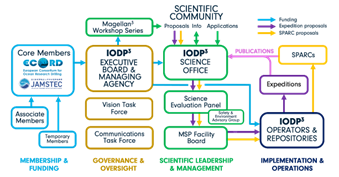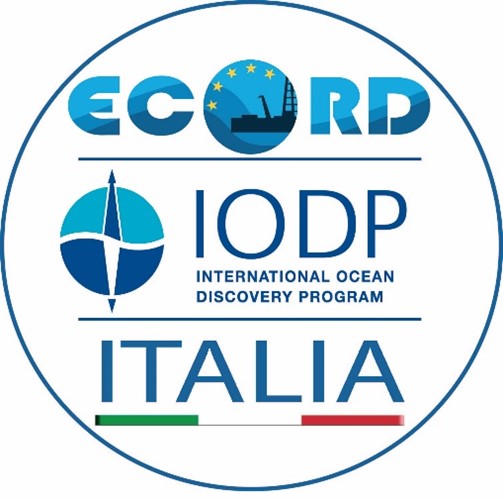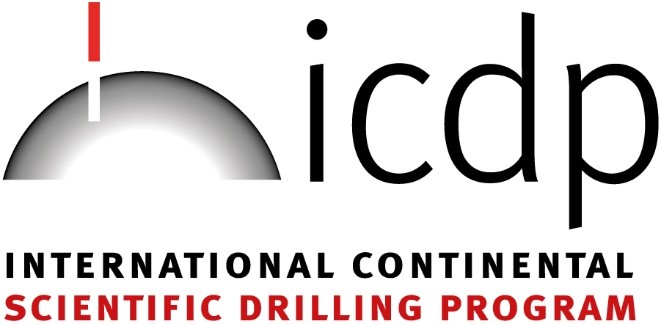
The International Ocean Drilling Programme (IODP3), building on the legacy of the previous IODP, DSPP and ODP programmes, https://www.iodp.org/) and the International Continental Scientific Drilling Programme (ICDP) are the two largest international Earth Science programmes dedicated to scientific drilling in the ocean and continental environments.
The International Ocean Drilling Programme (IODP3), built on the legacy of the previous IODP, DSPP and ODP programmes, https://www.iodp.org/) and the International Continental Scientific Drilling Programme (ICDP) are the two largest international Earth Science programmes dedicated to scientific drilling in the ocean and continental environments. IODP and ICDP, similar in structure and sharing programmatic links, represent multidisciplinary scientific collaborations in the geosciences. Both scientific drilling programmes are based on: Science Plans divided into strategic areas; strong international partnerships; a scientific-managerial structure organised into panels and commissions.
IODP3
The International Ocean Drilling Programme (IODP3) was launched on 1 January 2025, but builds on the legacy of previous ocean drilling programmes that began in 1968. IODP3 is an international marine research collaboration that explores the history and dynamics of the Earth using ocean-based research platforms to retrieve data recorded in seafloor sediments and rocks and to monitor subsurface environments.
IODP3 has two platform providers as core members and also benefits from potential financial contributions from other partner agencies (associate members, temporary members). Researchers from member countries are selected to participate in both IODP3 research expeditions conducted throughout the world’s oceans and in large-scale research projects using ocean drilling archives (Scientific Projects using Ocean Drilling Archives or SPARCs).

IODP3 at a glance
IODP3 will foster international scientific collaboration to address key scientific issues in Earth, ocean, environmental and life sciences, based on rock and/or sediment cores, borehole imaging, in situ observatory data and related geophysical imagery obtained on the seabed.
IODP3 will adopt a transparent, open, flexible and international modus operandi, standard policies and guidelines at programme level, sustainable management and publicly accessible knowledge-based resources.
IODP3 investigations will be based on research proposals that respond to the objectives of the “2050 Science Framework: Exploring Earth by Scientific Ocean Drilling”, of which IODP3 will adopt the basic principles.
IODP3 will implement offshore expeditions based on the Mission Specific Platform (MSP) concept and scientific projects using deep-ocean drilling archives (SPARC).

IODP-Italy and coordination with ICDP
Italy participates in IODP3 as a member country of the European consortium ECORD (European Consortium for Ocean Research Drilling), founded in 2003 and current core member of the ocean floor exploration program, similarly organized in a solid scientific-managerial structure equipped with panels, commissions and task forces.
The Italian participation in the major international drilling programs ECORD – IODP3 (International Ocean Drilling Programme) and ICDP (International Continental Scientific Drilling Program) is supported by the CNR ECORD-IODP and ICDP Commission, dedicated to scientific and programmatic-managerial coordination and to the promotion of activities in support of research, training and dissemination in the field of scientific drilling. In particular, the Italian participation in the IODP (IODP-Italy) is linked to the membership in the ECORD consortium, made possible by a dedicated MIUR funding, managed by the CNR since 2014.
ICDP
The International Continental Scientific Drilling Program (ICDP), is an international collaboration founded in 1996 and dedicated to continental drilling projects. Like the IODP, it is currently based on a scientific program, the ICDP Science Plan 2020-2030, divided into four main strategic themes:
- Geodynamic Processes
- Natural Hazards
- Georesources
- Environmental Changes

